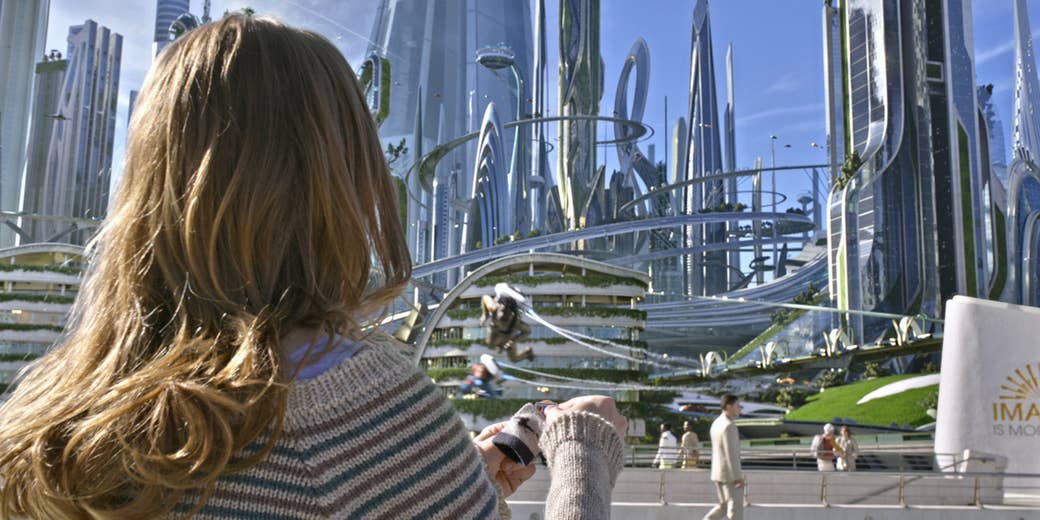
We take our futures dark these days. If we're not reveling in stories of approaching or full-on apocalypse — The Walking Dead, Mad Max: Fury Road, Terminator Genisys — then we're delving into the functioning but grim dystopias offered by The Maze Divergent Games. The doom and gloom is evidence of our continuing infatuation with the end of the world.
Tomorrowland would like to change that. Not just by presenting a throwback rockets-and-rayguns vision of the future rising on the horizon above amber waves of grain in a blaze of chrome and glass, but by arguing that it's actually better for humanity to look at the future through rose-colored lenses — necessary, even. Its teenage heroine, Casey Newton (Britt Robertson), is special not just because of her interest in technology and faith in its promise, but because she's an optimist. She believes that things can change for the better, when apparently everyone else has given up. At school, faced with a montage of dark messages about the environment and global politics and George Orwell, she persistently raises her hand to ask what we can do to fix things, while teachers gape at her in befuddlement.
Though it's not director Brad Bird's first retro-futuristic rodeo, Tomorrowland is his most stridently sermonizing. His animated The Iron Giant and The Incredibles were flavored with the future by way of the '50s and '60s, combining Cold War paranoia with the arrival of an alien robot and showcasing prime space-age design and gadgetry in a suburban superhero setting. But Tomorrowland is live action, and the CGI metropolis of its title is a whirring, splendidly realized place of flying monorails and space shuttles to the moon. In the movie, it's both an idea and a physical location tucked away in its own universe.
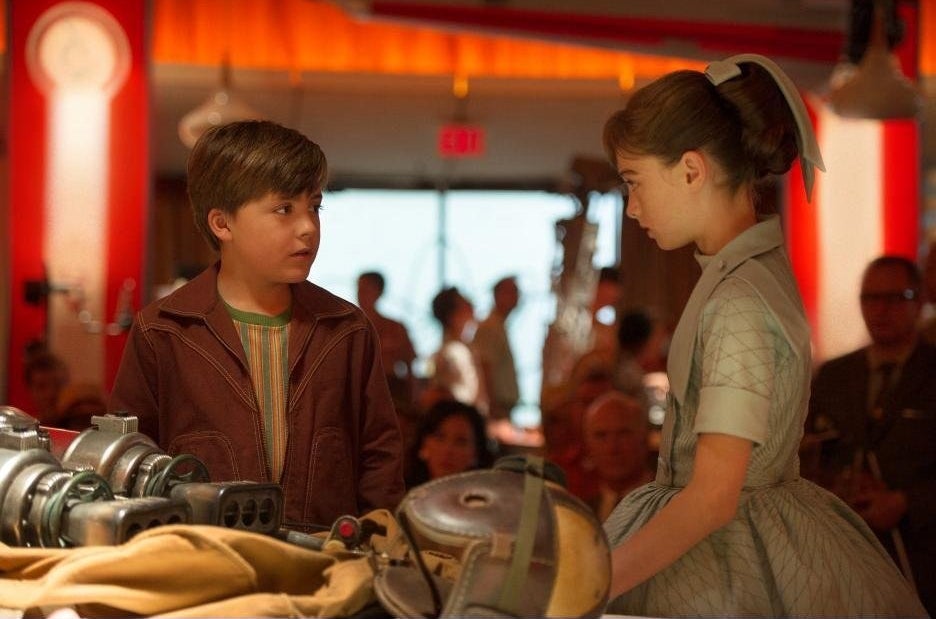
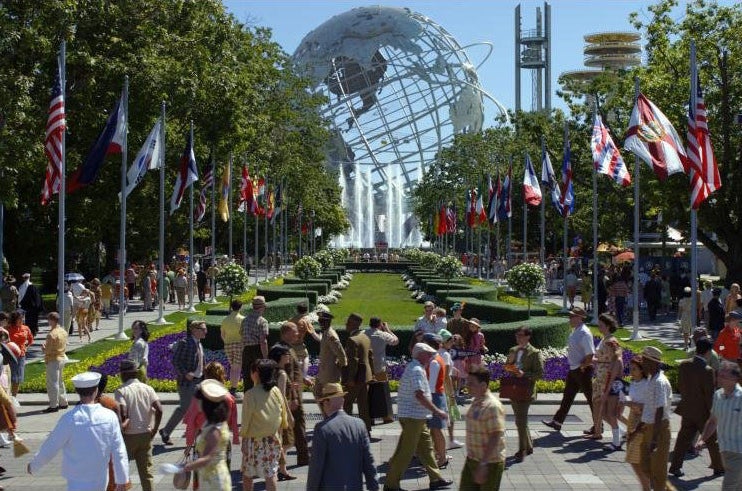
In the real world, it's part of a theme park, though Bird and screenwriter Damon Lindelof (whose last film was the — ahem — zombie apocalyptic World War Z) bypass the Magic Kingdom in favor of taking the Disney-influenced 1964 New York World's Fair as its major touchstone. It's the World's Fair where young Frank Walker (Thomas Robinson) brings his not-quite-working jetpack and meets the preternaturally composed Athena (scene-stealer Raffey Cassidy), who shows him the way to Tomorrowland, where the best and brightest work on creating a better world.
And somewhere after that, things went wrong, though Frank made the excellent choice of growing up to be George Clooney, even if he's also become a grumpy hermit living in high-tech seclusion until Athena and Casey enlist him to save the world. But there's a reason the movie takes so much time getting back to Tomorrowland, through a series of episodes that are often cleverly staged (Bird's deft with action) but start to feel like running in place, especially during a pretty but unnecessary visit to Paris.
It's because, despite the explanatory monologue the movie's villain unleashes about dark visions of the future just encouraging people to give up, utopias are boring. Tomorrowland is boring. The only interesting thing to be done with Tomorrowland is to save it. When it's up and running, it's a frictionless locale where idealism is everything, where concerns like money and cultural conflict have apparently been eliminated by technology. It's a nice place to visit, but you wouldn't set an actual movie there.
There's an earnest conviction to the message that Bird and Lindelof present in Tomorrowland, which urges its audience to be active, to seek solutions, and to consider the awesomeness of STEM fields. But it delivers this message by pitting utopia against dystopia in a way that's not just jarring but ultimately unfair, a dismissal of the issues we use dystopian fiction to explore and illuminate. 1984 isn't a classic because we like to wallow in bleakness.
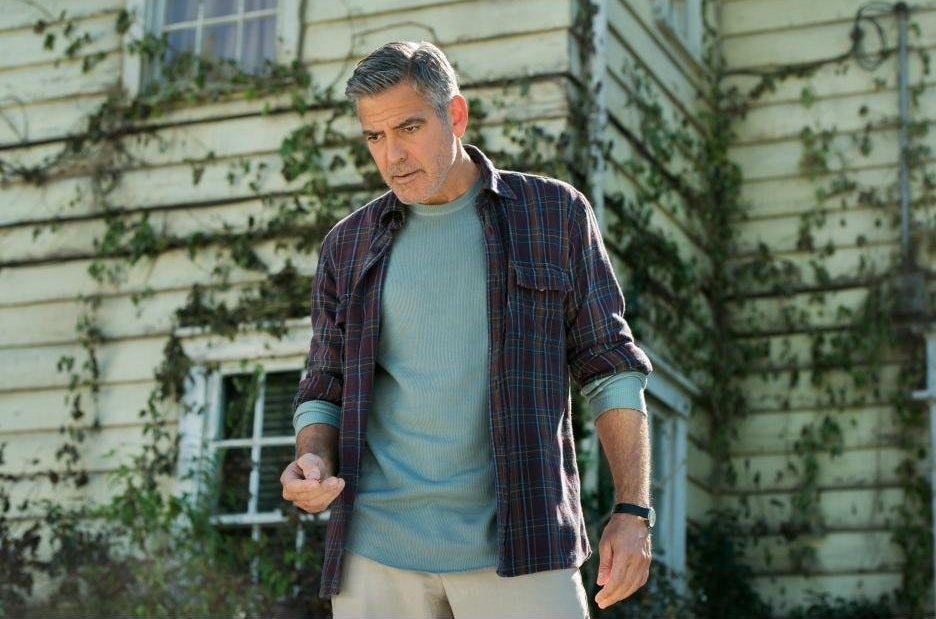
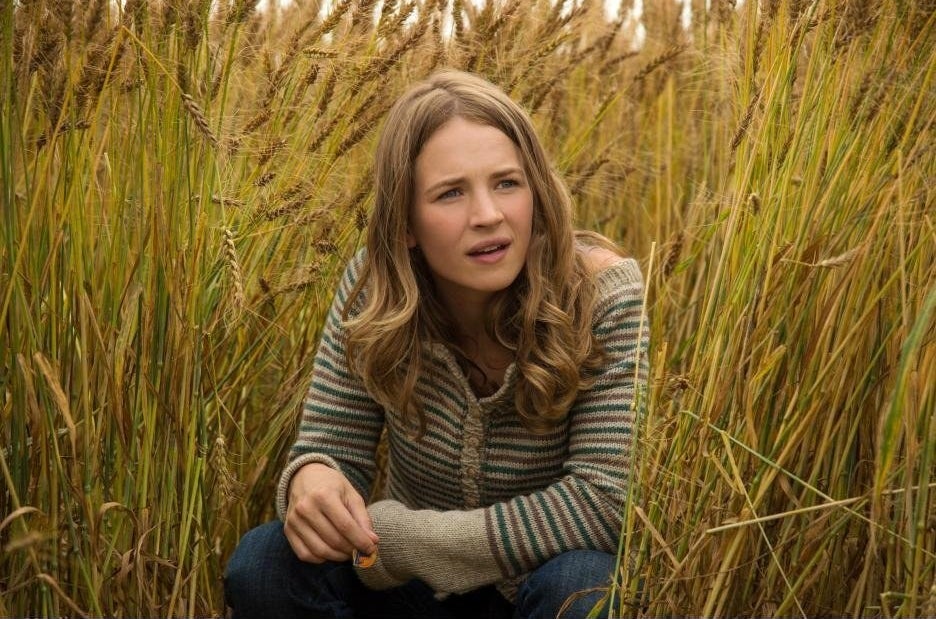
The movie ends with a vaguely techno-libertarian directive to stop complaining and start doing, which is more achievable when you have a magical realm of seemingly infinite resources at your disposal. Or as Casey puts it, "It's hard to have ideas and easy to give up" — a grating thing to hear from a perky suburban teenager whose repeated sabotaging of a NASA demolition site is treated as spunkiness.
There's a nostalgized sense of wonder that infuses the movie's opening scenes back in 1964 — but Tomorrowland struggles to update that '60s-style future for our present, in part because it doesn't reflect the world we live in now. Hell, it doesn't even reflect the entirety of the decade from which it was plucked, a decade that erupted in counterculture and protest. There was a fundamental conservative escapism to that shiny vision of the future, so concerned with flying cars and so oblivious to the internet — it's an amped-up version of an idealized All-American city, in the same way The Jetsons just gave a space-age version to a regular old family sitcom.
The cyberpunk Los Angeles of Blade Runner may have been a fucked-up place full of megacorporations and killer replicants, but it was also globalized, a city where a giant Japanese ad played on the side of a building, where people spoke multinational pidgin. Its hero didn't get a hamburger from some cutting-edge automat, he rubbed chopsticks together before digging into a bowl at a sidewalk noodle bar. Class and poverty were visible everywhere, not erased from sight.
If Tomorrowland's futurescape is aspirational, it's still one in which the smartest people in the world band together to come up with something that is coincidentally right out of Walt Disney's 1960s dreams, with a few more people of color scattered through the background. Its celebration of dreamers may be optimistic, but it's also exclusionary, one in which the gifted elite who are going to save everyone are also the ones who got everyone into trouble in the first place. And anyway, utopia is always going to be better in theory than in practice, especially when it comes to the tricky issue of finding someone to foot the bill — after all, Disneyland's first version of Tomorrowland was sponsored by, among others, Monsanto.
